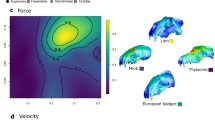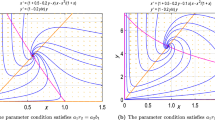Abstract
Organisms embedded within food webs must balance arms races with their predators and prey. For venom users, venom may mediate each arms race, but the dynamical evolutionary changes in venom production in response to the two arms races are still poorly understood. Here, we use a simple model to evaluate the evolutionary response of a venomous consumer to the presence of an apex generalist predator and evolution of the consumer’s prey. We find that introduction of the apex predator can weaken the arms race between the two lower trophic levels. In addition, when consumer prey capture and predator defense venoms functionally overlap, a reduced evolutionary response in the prey population can drive investment in venom used for prey capture going beyond what is optimal for subduing prey. These dynamics suggest that interactions with multiple trophic levels can substantially alter the venom complexity in predatory venomous animals and may explain the paradox of the overkill hypothesis.


Similar content being viewed by others
References
Abrams PA (1991) The effects of interacting species on predator-prey coevolution. Theor Popul Biol 39(3):241–262. https://doi.org/10.1016/0040-5809(91)90022-8
Abrams PA (2001) Modelling the adaptive dynamics of traits involved in inter- and intraspecific interactions: an assessment of three methods. Ecol Lett 4(2):166–175. https://doi.org/10.1046/j.1461-0248.2001.00199.x
Adler M, Anjum M, Berg OG, Andersson DI, Sandegren L (2014) High fitness costs and instability of gene duplications reduce rates of evolution of new genes by duplication-divergence mechanisms. Mol Biol Evol 31(6):1526–1535. https://doi.org/10.1093/molbev/msu111
Casewell NR, Wüster W, Vonk FJ, Harrison RA, Fry BG (2013) Complex cocktails: the evolutionary novelty of venoms. Trends Ecol Evol 28(4):219–229. https://doi.org/10.1016/j.tree.2012.10.020
Currie CR, Wong B, Stuart AE, Schultz TR, Rehner SA, Mueller UG, Sung G-H, Spatafora JW, Straus NA (2003) Ancient tripartite coevolution in the attine ant-microbe symbiosis. Science 299(5605):386–388. https://doi.org/10.1126/science.1078155
Dawkins R and Krebs JR (1979) Arms races between and within species. Proc. R. Soc. Lond., Ser. B: Biol. Sci. 205: 489–511. https://doi.org/10.1098/rspb.1979.0081
Dercole F, Ferriere R, Rinaldi S (2010) Chaotic Red Queen coevolution in three-species food chains. Proc R Soc B 277(1692):2321–2330. https://doi.org/10.1098/rspb.2010.0209
Dietl GP and Kelley PH (2002) The fossil record of predator-prey arms races: coevolution and escalation hypotheses. Paleontological Society Papers 8: 353–374
Drabeck DH, Dean AM, Jansa SA (2015) Why the honey badger don’t care: convergent evolution of venom-targeted nicotinic acetylcholine receptors in mammals that survive venomous snake bites. Toxicon 99:68–72. https://doi.org/10.1016/j.toxicon.2015.03.007
Dutertre S, Jin A-H, Vetter I, Hamilton B, Sunagar K, Lavergne V, Dutertre V, Fry BG, Antunes A, Venter DJ (2014) Evolution of separate predation-and defence-evoked venoms in carnivorous cone snails. Nat Commun 5:3521. https://doi.org/10.1038/ncomms4521
Fry BG, Roelants K, Champagne DE, Scheib H, Tyndall JD, King GF, Nevalainen TJ, Norman JA, Lewis RJ and Norton RS (2009) The toxicogenomic multiverse: convergent recruitment of proteins into animal venoms. Annu Rev Genom Hum Genet 10: 483–511. https://doi.org/10.1146/annurev.genom.9.081307.164356
Hayes WK (1992) Prey-handling and envenomation strategies of prairie rattlesnakes (Crotalus v. viridis) feeding on mice and sparrows. J Herpetol 26(4):496–499. https://doi.org/10.2307/1565129
Hayes WK, Herbert SS, Harrison JR, Wiley KL (2008) Spitting versus biting: differential venom gland contraction regulates venom expenditure in the black-necked spitting cobra, Naja nigricollis nigricollis. J Herpetol 42(3):453–460. https://doi.org/10.1670/07-076.1
Inceoglu B, Lango J, Jing J, Chen L, Doymaz F, Pessah IN, Hammock BD (2003) One scorpion, two venoms: prevenom of Parabuthus transvaalicus acts as an alternative type of venom with distinct mechanism of action. Proc Natl Acad Sci U S A 100(3):922–927. https://doi.org/10.1073/pnas.242735499
Jansa SA and Voss RS (2011) Adaptive evolution of the venom-targeted vWF protein in opossums that eat pitvipers. PLoS One 6(6):e20997. https://doi.org/10.1371/journal.pone.0020997
Kuhn-Nentwig L, Stöcklin R and Nentwig W (2011) Venom composition and strategies in spiders: is everything possible? Adv. Insect Physiol 40: 1
Li M, Fry BG, Kini RM (2005) Eggs-only diet: its implications for the toxin profile changes and ecology of the marbled sea snake (Aipysurus eydouxii). J Mol Evol 60(1):81–89. https://doi.org/10.1007/s00239-004-0138-0
McCue MD (2006) Cost of producing venom in three North American pitviper species. Copeia 2006: 818–825. https://doi.org/10.1643/0045-8511(2006)6[818:COPVIT]2.0.CO;2
Mebs D (2001) Toxicity in animals. Trends in evolution? Toxicon 39(1):87–96. https://doi.org/10.1016/S0041-0101(00)00155-0
Moran Y, Praher D, Schlesinger A, Ayalon A, Tal Y, Technau U (2013) Analysis of soluble protein contents from the nematocysts of a model sea anemone sheds light on venom evolution. Mar Biotechnol 15(3):329–339. https://doi.org/10.1007/s10126-012-9491-y
Morgenstern D and King GF (2013) The venom optimization hypothesis revisited. Toxicon 63:120–128. https://doi.org/10.1016/j.toxicon.2012.11.022
Nersesian CL, Banks PB, McArthur C (2011) Titrating the cost of plant toxins against predators: determining the tipping point for foraging herbivores. J Anim Ecol 80(4):753–760. https://doi.org/10.1111/j.1365-2656.2011.01822.x
Nisani Z, Boskovic DS, Dunbar SG, Kelln W, Hayes WK (2012) Investigating the chemical profile of regenerated scorpion (Parabuthus transvaalicus) venom in relation to metabolic cost and toxicity. Toxicon 60(3):315–323. https://doi.org/10.1016/j.toxicon.2012.04.343
Philpot VB and Stjernholm RL (1984) Resistance of reptiles to venoms. In: Hoff GL (ed) Diseases of amphibians and reptiles. Springer US, pp. 693–701. https://doi.org/10.1007/978-1-4615-9391-1-27
R Development Core Team (2014) R: a language and environment for statistical computing. R Foundation for Statistical Computing
Rowe AH, Xiao Y, Rowe MP, Cummins TR, Zakon HH (2013) Voltage-gated sodium channel in grasshopper mice defends against bark scorpion toxin. Science 342(6157):441–446. https://doi.org/10.1126/science.1236451
Sasa M (1999) Diet and snake venom evolution: can local selection alone explain intraspecific venom variation? Toxicon 37(2):249–252
Smith MT, Ortega J, Beaupre SJ (2014) Metabolic cost of venom replenishment by Prairie Rattlesnakes (Crotalus viridis viridis). Toxicon 86:1–7. https://doi.org/10.1016/j.toxicon.2014.04.013
Sunagar K and Moran Y (2015) The rise and fall of an evolutionary innovation: contrasting strategies of venom evolution in ancient and young animals. PLoS Genet 11(10):e1005596. https://doi.org/10.1371/journal.pgen.1005596
Vermeij GJ (1982) Unsuccessful predation and evolution. Am Nat 120(6):701–720. https://doi.org/10.1086/284025
Voss RS (2013) Opossums (Mammalia: Didelphidae) in the diets of Neotropical pitvipers (Serpentes: Crotalinae): evidence for alternative coevolutionary outcomes? Toxicon 66:1–6. https://doi.org/10.1016/j.toxicon.2013.01.013
Wade MJ (2007) The co-evolutionary genetics of ecological communities. Nat Rev Genet 8(3):185–195. https://doi.org/10.1038/nrg2031
Author information
Authors and Affiliations
Corresponding author
Rights and permissions
About this article
Cite this article
Gangur, A.N., Seymour, J.E., Liddell, M.J. et al. When is overkill optimal? Tritrophic interactions reveal new insights into venom evolution. Theor Ecol 11, 141–149 (2018). https://doi.org/10.1007/s12080-017-0354-z
Received:
Accepted:
Published:
Issue Date:
DOI: https://doi.org/10.1007/s12080-017-0354-z




